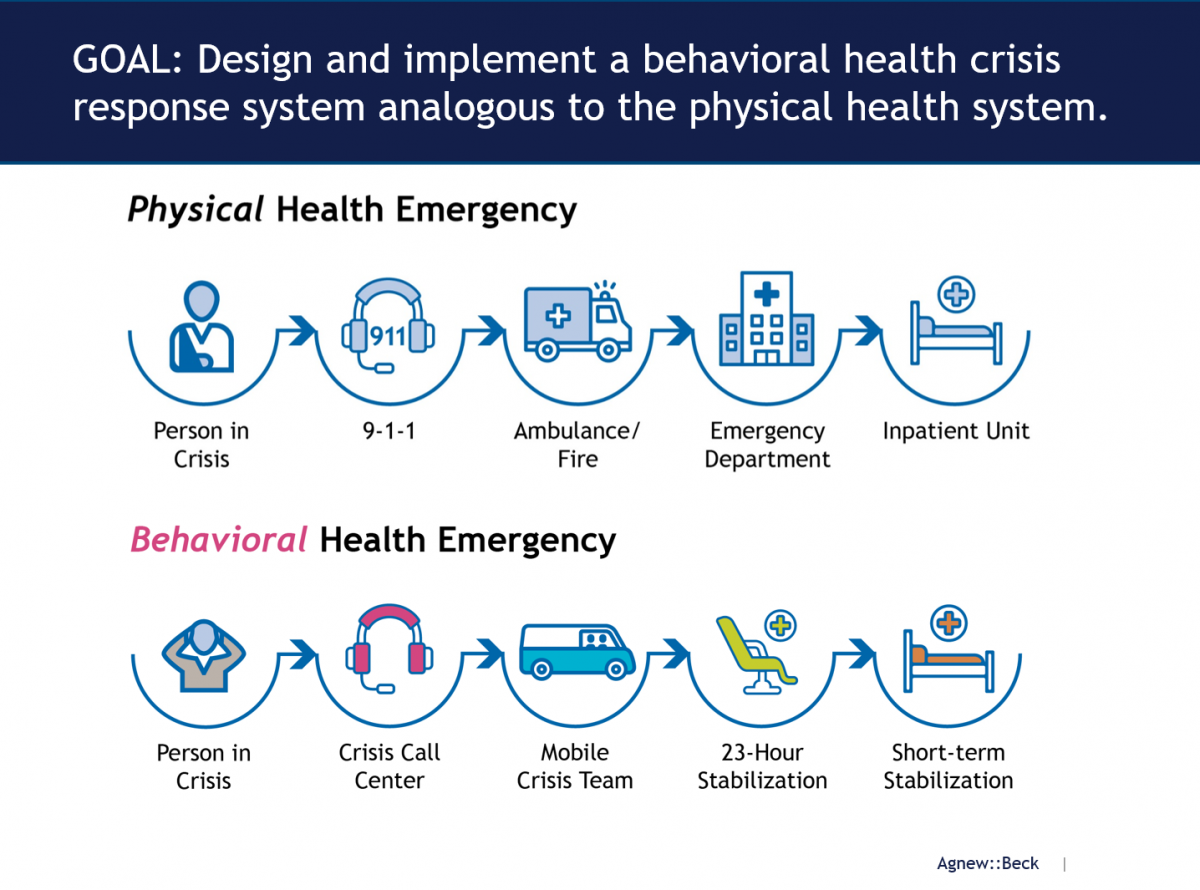Crisis Now

Need to talk?
If you are currently in crisis and need to talk to somebody, please call Careline at 988 anytime.
Need someone to respond to your location?
In a behavioral health crisis, call 911 to request the Mobile Crisis Team (MCT).
What is Crisis Now?
The Crisis Now model is a collaborative and comprehensive approach to behavioral health crisis mitigation. Crisis Now connects people with the most appropriate resources from the onset of the crisis through their recovery and follow up care. The model is the combination of national best practices woven into a framework that is tailored to meet Fairbanks' needs. The essential Crisis Now components will be available all day, everyday.
What are the essential components of Crisis Now?
- Crisis Call Center: A Crisis Now Call Center is often compared to an air traffic control center. The Call Center will
- meet all National Suicide Prevention Lifeline (NSPL) operational guidelines
- remain in constant collaboration with 911 dispatcher
- be able to dispatch a mobile crisis team independently
- maintain real-time information on available resources
- have the ability to book appointments for partnering follow up services 24 hours a day
- Mobile Crisis Team: The Mobile Crisis Team (MCT) will respond to calls that cannot be resolved remotely. The MCTs will consist of a licensed clinician and a certified peer support specialist that will
- respond with or without other emergency services as appropriate
- triage
- assess the person in crisis
- deescalate situations
- coordinate with other services
- follow up with the person post-crisis as needed
- 23 Hour & Short Term Stabilization: This facility will provide no-wrong-door access to mental health and substance use care and operate much like a hospital emergency department that accepts all walk-ins as well as mobile crisis team, ambulance, fire and police drop offs. This crisis response center will be have 23 hour stabilization units and short term stabilization units for those needing two to five days of support. The center will be staffed by a multi-disciplinary team equipped to
- accept and medically clear all referrals
- assess and diagnose conditions
- determine appropriate level of care
- develop full spectrum treatment plans
- connect the person with appropriate follow up services
Why adopt a Crisis Now model?
Simply put, the Crisis Now model is the most effective and efficient crisis mitigation model there is. In Fairbanks and throughout Alaska, behavioral health resources are limited. Our current system relies heavily upon law enforcement, EMS, and the hospital emergency room to serve people in behavioral health crisis. In the current system, meaningful contact with dedicated behavioral health services might not happen until days later. Crisis Now changes that dynamic. With Crisis Now, people in crisis are seamlessly connected to the appropriate services as soon as they access the system. The Crisis Now model provides someone to talk to, someone to respond, and a place to go in a timely manner.
How is Crisis Now developing in Alaska?
The Alaska Mental Health Trust Authority (Trust) and the Alaska Department of Health and Social Services (DHSS) have been researching Crisis Now for years. In 2019, the Trust hired RI International (RI), a long standing operator and consultant on the Crisis Now framework, to conduct a feasibility assessment of implementing the Crisis Now model in Anchorage, Fairbanks, and the Mat-Su. Please see the RI report in the supporting documents below. Following the RI report, the Trust, with support of Agnew::Beck, held several stakeholder meetings in the three communities to establish the local planning teams. The local planning teams are working to adopt the Crisis Now fundamentals to their unique communities.
When will Crisis Now launch in Fairbanks?
The Mobile Crisis Team launched in the fall of 2021. The City of Fairbanks has passed a resolution listing a comprehensive Crisis Now stabilization center as a legislative priority in October 2023.
Crisis Now in the News
December 8, 2023: KTVF - Mobile Crisis team Resolving Higher Percentage of Calls Without Police or Hospitalizations
October 25, 2023: Fairbanks Daily News Miner - PFAS, Mental Health Needs, Public Employee Benefits Top City's Wishlist of Lawmaker Priorities
September, 20, 2023: Fairbanks Daily News Miner - Fairbanks Capital Priorities Include Stabilization Center
August 14, 2023: KTVF - Crisis Now Meetings Gather Likeminded People for Crisis Mitigation Solutions
May 18, 2023: Anchorage Daily News - For Alaskans in Behavioral Health Emergencies, Mobile Crisis Teams are an Effective New Approach
December 21, 2022: KUAC - Mobile Crisis Team is Busier than Ever
December 8th, 2022: State of Reform - Fairbanks Mobile Crisis Teams Awarded $800,000 Grant to Strengthen Crisis Response
November 15, 2022: Fairbanks Daily News Miner - Crisis Now Facilitates, Assists with Behavioral Health
April 18, 2022: KTVF 11- City of Fairbanks Welcomes New Coordinator for Crisis Now Program
December 10, 2021: Alaska Public Media - A New Crisis Team in Fairbanks is Responding to Mental Health Calls and Freeing Up Other Emergency Resources
